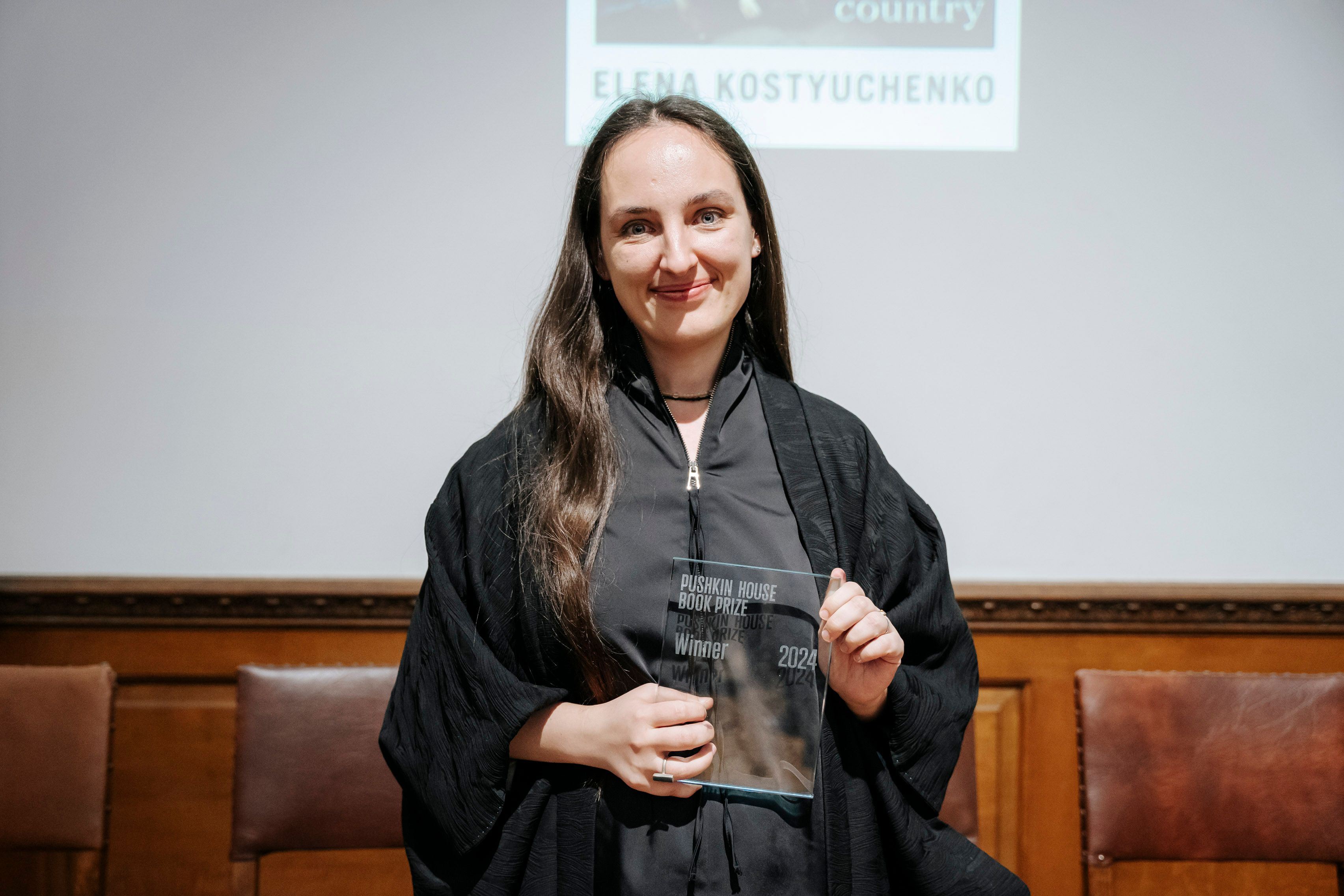
Photo credit: Rocio Chacon
Elena Kostioutchenko s’est vu décerner le Pushkin House Book Prize 2024, qui lui a été remis à Londres le 14 juin dernier en présence de l’une de ses traductrices et de son éditeur britannique.
La Pushkin House est un espace artistique, culturel et social situé à Londres qui explore, remet en question et débat de la culture et de l’identité russes aujourd’hui. Le Pushkin House Book Prize a été créé en 2013 afin de récompenser et d’attirer l’attention sur les ouvrages de non-fiction provenant de Russie ou portant sur ce pays, écrits ou traduits en anglais. Les sujets des livres sélectionnés ne concernent pas seulement la vie et la culture à l’intérieur des frontières de l’actuelle Fédération de Russie, mais aussi l’expérience de ceux dont les terres natales ont été affectées par l’Empire russe et l’Union soviétique.
 Les éditions Noir sur blanc ont publié l’édition française, intitulée RUSSIE, MON PAYS BIEN-AIME, en février 2024 dans une traduction d’Emma Lavigne et Anne-Marie Tatsis-Botton.
Les éditions Noir sur blanc ont publié l’édition française, intitulée RUSSIE, MON PAYS BIEN-AIME, en février 2024 dans une traduction d’Emma Lavigne et Anne-Marie Tatsis-Botton.
« Être journaliste, c’est dire la vérité. Avec Mon pays bien-aimé, Elena Kostioutchenko documente son pays, tel qu’il est vécu par celles et ceux qu’il efface systématiquement, par exemple les filles de la campagne recrutées comme travailleuses du sexe, les personnes queer des provinces éloignées, les patientes et les médecins d’une maternité ukrainienne – et les journalistes, dont elle fait partie.
Cet ouvrage est le portrait singulier d’une nation, et celui d’une jeune femme qui refuse de garder le silence. En mars 2022, alors qu’elle est reporter pour Novaïa Gazeta, l’un des derniers journaux russes indépendants, Kostioutchenko se rend en Ukraine pour couvrir la guerre. Elle se donne pour mission d’informer les Russes sur les horreurs que Poutine commet en leur nom. Elle sait dès le début que si elle retourne dans son pays, elle risque d’être condamnée à quinze ans de prison, sinon pire. Portée par la conviction que la plus grande forme d’amour et de patriotisme est la critique, elle continue à écrire, nullement découragée, les yeux grand ouverts. »

 LAST TO EAT, LAST TO LEARN is the remarkable memoir of Pashtana Durrani, a 23-year-old Afghan woman, who has pursued her passion for educating the “disappearing girls” of the remote, contested rural tribal regions, amidst all the turmoil, violence and oppression that has enveloped her country – and her family — over a generation.
LAST TO EAT, LAST TO LEARN is the remarkable memoir of Pashtana Durrani, a 23-year-old Afghan woman, who has pursued her passion for educating the “disappearing girls” of the remote, contested rural tribal regions, amidst all the turmoil, violence and oppression that has enveloped her country – and her family — over a generation. When it was released to the public in November 2022, ChatGPT sparked a global commotion. Now, anyone could be a novelist. Brands could generate copy and students could pen essays in mere seconds, all thanks to this frighteningly smart algorithm turned ghostwriter that could crank out pages of text at the drop of a prompt. Had writing just been democratized or destroyed?
When it was released to the public in November 2022, ChatGPT sparked a global commotion. Now, anyone could be a novelist. Brands could generate copy and students could pen essays in mere seconds, all thanks to this frighteningly smart algorithm turned ghostwriter that could crank out pages of text at the drop of a prompt. Had writing just been democratized or destroyed? It’s an international tale that takes us from Mozambique to Australia, from Hong Kong to New York, and of course, inside the hushed, marble corridors of Zurich’s banking elite.
It’s an international tale that takes us from Mozambique to Australia, from Hong Kong to New York, and of course, inside the hushed, marble corridors of Zurich’s banking elite. GOING NUCLEAR will be an exploration of the immense power in the centre of the atom, the areas of our world that it touches, and the potential it has to solve the biggest problems our species faces. The book retraces our relationship with nuclear through the Nuclear Revolution of the early 20th century and look towards the Nuclear Renaissance that could — and should — ensue over the coming decades. Gregory argues convincingly that there is no net zero without nuclear power.
GOING NUCLEAR will be an exploration of the immense power in the centre of the atom, the areas of our world that it touches, and the potential it has to solve the biggest problems our species faces. The book retraces our relationship with nuclear through the Nuclear Revolution of the early 20th century and look towards the Nuclear Renaissance that could — and should — ensue over the coming decades. Gregory argues convincingly that there is no net zero without nuclear power.